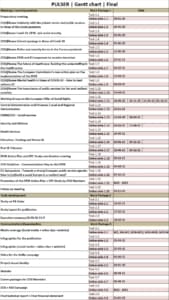2021-04-03 05:04
The PULSER project aims to organize four sectoral training and working groups on how to support the reforms of Public Administration, manage the changes in public services and the work of public services personnel, and to exchange transnational good practices.

#PULSER – Performing public services and performing public service personnel for the best possible implementation of the European Pillar of Social Rights
Summary of the action
Crises may become the new normal, but they remain unpredictable in nature and scope. As public services cannot be equipped overnight in a tailored manner, the foresighted investment appears to be increasingly necessary. Public services care for, protect and support – the citizens, the society and the economy. They determine whether societies are sustainable or not. They are crucial to implement the principles of the European Pillar of Social Rights.
CESI’s particular strength lies in the public sector but CESI also represents private-sector workers. Most of CESI’s affiliates are employed in the central, regional and local administrations, security and justice, education, training and research, healthcare, postal services and telecommunications, defence and transport.
The PULSER project supported the recognition of the European public sector workers, the implementation of the Commission’s political guidelines and the full ownership of the European Pillar of Social Rights.
Main objectives of the action
In the first phase, the PULSER project aimed to organise sectoral training and work groups about the European Pillar of Social Rights, data collection and valorisation of public services in the following sectors:
- Central government administration and finance as well as Local and regional administration, representing personnel in all levels and sections of government, agencies and public bodies;
- Security and defence services, representing police personnel, soldiers, prison wards and justice sector staff in all levels of the judicial systems;
- Health services, representing hospital staff, nurses and physicians;
- Education, Training and Research, representing teachers and educators in primary, secondary and tertiary education as well as in VET and further professional training;
- Post & Telecoms, representing the personnel of national postal and telecoms service.
The sectoral work groups generated an expert study carried out in collaboration with the EPC – European Policy Centre on ‘Well-performing public services for a fair and resilient European society’. The focus of the study is on the performance of public services and the role of public service personnel in Europe, highlighting also the social return on investment that they generate.
In the second phase, CESI targeted a second (larger) group of trade union representatives and experts with the EU Conference in Brussels and online entitled ‘‘Towards a strong European public service agenda: How to (re)build a social Europe in a resilient way after Covid-19?’’. The conference, with the participation of EC policy officers and EP legislators, provided additional information and shared opportunities for public services personnel to develop new skills and boost the quality of work.
During the European conference, CESI presented the full communication package developed for the campaign comprising the full study in English, the executive summaries (EN, FR, DE, ES, IT), visual identity for the website and social media, infographics and awareness animated video.
A total of 8 CESI member organizations (from Italy, Spain, Hungary, Lithuania, Romania and Poland) used the opportunity of the CESI PULSER project to bring the Pillar closer to their member organisations and workers from different sectors.
Key results
The specific results/outcomes delivered by the project:
- Support in public recognition of the value of public services and the work public services personnel provide especially during the Covid-19 global pandemic with a series of public events, the European conference and awareness-raising digital campaigns;
- Information dissemination about the EC President’s political guidelines, the DG Employment’s work priority and the Action Plan for the 20 key principles and rights of the European Pillar of Social Rights within the mentioned above work sessions;
- Update and support from EC experts to trade unions’ representatives on the legislative priorities and training on how to enrol in national and European programs for public services personnel with the focus on future digital skills, quality at work and management of change in the abovementioned sectors/working groups;
- Made a case for adequate underpinning public resources management to support the implementation of policy responses by the public sector and its employees and officials with a study published by the EPC – European Policy Centre;
- Raised awareness among policymakers and the general public about the added value of performing public services as a backbone to achieve more sustainable and inclusive economic growth and more social equality.

Duration of the activities
The project started in January 2019 and continued until December 2021 for a duration of approx. 24 months, plus the reporting phase.
HERE the deliverables of PULSER project
Project Manager: Tomasz Koguc
Project Coordinator: Marcella Migliori
The project is co-funded by the European Union




